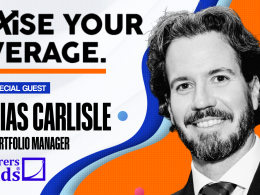Consuelo Mack WealthTrack - October 15, 2010
CONSUELO MACK: This week on WealthTrack, Financial Thought Leader and Great Investor Rob Arnott created fundamental indexing plus the first global funds to actively invest in all asset classes. What is this financial innovator cooking up now for better investment returns? Research Affiliates’ Rob Arnott is next on Consuelo Mack WealthTrack.
Hello and welcome to this edition of WealthTrack. I’m Consuelo Mack. Can you really create a better mousetrap as an investor so you will have enough proverbial cheese to see you through a lifetime? Well, that is a question we try to answer every week on WealthTrack, and it turns out there are some old-fashioned solutions and there are some intriguing new ones, which we will discuss with this week’s guest.
The years 1999 to 2009 were financially devastating to many investors. They were called “the lost decade” because the benchmark U.S. stock market, the S&P 500, lost money over the period, and widely followed global stock indexes barely made money, averaging under 1% annualized returns. So much, we thought, for the notion of stocks for the long run, and therein lies the problem. Too many of us relied too heavily on stocks. Had we truly diversified across many asset classes and countries, we would have made money.
Emerging market bonds delivered nearly 11% annualized returns; Treasury inflation protected securities or TIPS nearly 8%; long Treasury bonds delivered 7.6% a year; high-yield bonds 6.7%; real estate investment trusts or REITs more than 10%; and commodities a little over 7%.
But this week’s guest says investors made another costly mistake: investing in capitalization-weighted indexes. Now, these are the very popular index funds based on the market prices of the stocks, bonds or other securities that make up the index. Rob Arnott and his firm Research Affiliates have created an alternative. They were recently awarded the patent for “fundamental index” methodology. It replaces market value with four fundamental financial measures. Instead of stock price, the companies are valued on sales, cash flow, dividends and book value. And when Arnott back-tested the Research Affiliates Fundamental Indexes, RAFI for short, in different asset classes, they outperformed the old cap-weighted indexes over the decade.
For example, the large company U.S. Fundamental Index delivered nearly 5% annualized returns, the Global Fundamental Index nearly 8% returns on average, and the Emerging Market Fundamental Index came in with 19% annualized returns over the decade.
Research Affiliates is one of WealthTrack’s sponsors, but its chairman and founder, Rob Arnott, is considered to be one of the industry’s financial thought leaders. Editor of several highly respected financial journals with more than 70 published articles, he is also an industry innovator, creating several widely used products. I asked him what led him to fundamental indexing.
ROB ARNOTT: Well, the genesis for this actually goes back to a friend of mine, George Cain, who used to run the Common Fund, commingled university endowments, and he sat on a number of state boards and was horrified in the year 2000 as he saw more and more money being pushed into the ultra-high multiple growth stocks, the Ciscos of the world, even the Pets.com of the world, these companies that had no plausible way to earn enough money in the future to justify the then-current prices. And they became a larger and larger part of the portfolio, only because they were so expensive. He thought there had to be a better way. Why on earth should a popularity-weighted index be a good idea?
So why don’t we use company sizes and anchor to contra trade, bring the growth stocks down to their economic size, take the value stocks up to their economic size and just use that as an anchor for rebalancing. It seemed to us at the time that this is something that probably ought to work, as in probably ought to add some value. It never occurred to us how much value would be added.
CONSUELO MACK: As you've written to your clients, the lost decade from 1999, from 2000 to 2010 was not a lost decade at all, depending on how you had invested.
ROB ARNOTT: Right. And so cap weighting was one very big problem, especially in that decade because that decade was book-ended by two crises: one, what’s called the TMT bubble, the technology-media-telecom bubble and crash, and then the 2009 financial services, industrials, consumer discretionary anti-bubble, where they were collectively priced as if they might all disappear as industries. Well, how is that going to happen? Then, the snapback for the survivors. True, there were some that didn’t make it, but the snapback for the survivors was so vigorous that buying in at the bottom, when everyone was terrified, was actually a very profitable thing to do. Fundamental index gives you an objective basis to do the uncomfortable- to trim the popular, the comfort stocks, the safe havens, the growth stocks and to buy into whatever is most deeply out of favor.
CONSUELO MACK: Now the market capitalization indexes, and a lot of our viewers I’m sure have owned market capitalization index funds.
ROB ARNOTT: Of course they do.
CONSUELO MACK: And certainly some legendary individuals in the investment sphere, Jack Bogle comes to mind.
ROB ARNOTT: One of my heroes.
CONSUELO MACK: Vanguard has been a huge proponent of market cap indexes. Number one, do you know how Jack Bogle feels about fundamental indexation, and number two, do you think that the market capitalization is so flawed that it should actually be a disservice for investors to be invested in them?
ROB ARNOTT: I don’t think it’s a disservice at all. Firstly, Jack Bogle is one of my heroes. I started Research Affiliates a few months after having dinner with him knowing that he’d started Vanguard at roughly the age I was when we had dinner. So in many ways he’s my inspiration.
Jack was a pioneer. He is absolutely right that if you’re not invested at the market weight, you’re making a bet relative to the market, and for me to make a bet, somebody has to be on the other side of that bet. So for me to win, there has to be a loser. Okay. Who is that loser? It’s a zero sum game in terms of value added. But if you can identify who the loser is, maybe you’d have some more confidence in your ability to add value. The loser is the trend-chasing, comfort-seeking investor. Are there trend-chasing, comfort-seeking investors out there? Yes, legions of them. The market doesn’t reward comfort. It rewards discomfort.
One of the fascinating nuances of fundamental index is that while it has a value tilt, it makes most of its money not from a value tilt but from contra trading against the markets’ constantly changing opinions. And the value tilt, while it’s a little bit uncomfortable- you’re investing in companies that are out of favor and are cheap, and some of them deserve to be cheap- the uncomfortable part of fundamental index is what makes the most money, and that’s the trading.
CONSUELO MACK: What were some of the lessons that you learned and that we should take away from that crisis and the crisis itself and this very fast recovery as far as the markets are concerned afterwards?
ROB ARNOTT: The main lessons I think are ones that the markets teach us again and again and again. Warren Buffett says we should be greedy when others are terrified, terrified when others are greedy. Early 2009, the investment community was terrified. I was terrified. But I knew it was a great time to take risk because people were terrified of risk. A year after this the market recovers, heroically. I almost said handsomely. It was better than that. And you have so many investors, professional investors, who think, oh, thank goodness the financial crisis is behind us.
CONSUELO MACK: You don’t think so?













